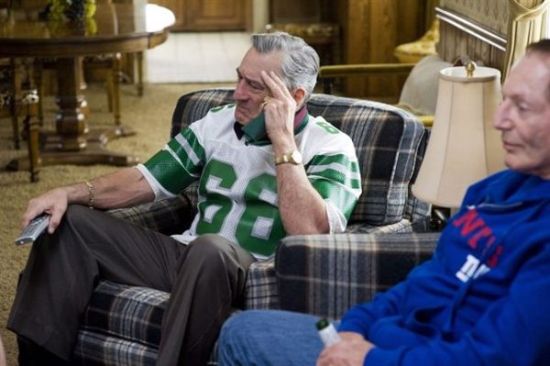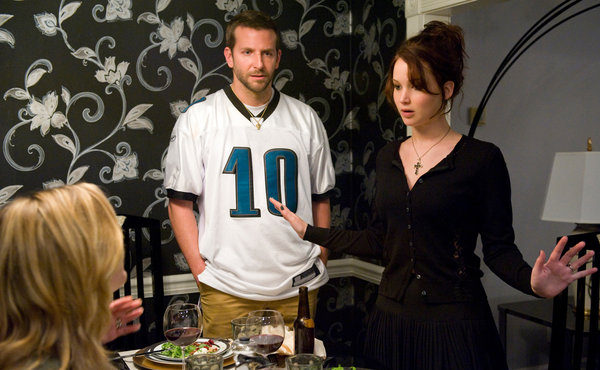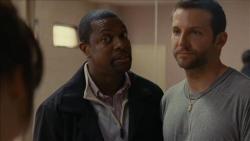David here. What induces you to give a film a second viewing? Usually, I suspect it comes down to adoration, and the desire to feel that rush of emotion again, whether it was delirious laughter, cathartic sobbing or immobilising terror. The 'Repeaters' are the films that become mainstays of your life, the comfort food, the personal canon. We’ve all got them.
 Robert's second viewing face
Robert's second viewing face
Rarer, though, are the second viewings induced by curiosity. There are so many movies from every decade and country that there’s really always something new to watch -- why waste time on something you’ve already seen and didn’t even like that much? Movies, especially in Oscar season, don’t exist in a vacuum – there is so much discussion around movies, be it from friends or critics or random people on the internet like me, that sometimes you’re forced to think about films you didn't respond to more often than you would have otherwise. Sometimes you find yourself needing to reevalute.
A case in point after the jump...
By the time most of us clapped our eyes on Silver Linings Playbook, we’d already ridden the internet rollercoaster from the first festival cries of “sensational crowd pleaser!” to pockets of bewildered critical reaction to the Weinsteins’ achingly slow US release pattern. I joined the bewildered crowd, expecting more dramatic depth and insight into mental illness from a film touted as an Oscar contender. I was especially disappointed by the formulaic patterns of the climax.
 BCoop and JLaw
BCoop and JLaw
Fast-forward a few months. After months of continuing confusion over the adoration for the film the ever-eloquent Guy Lodge wrote a superb defence of the film’s place in the Oscar line-up, and I was suddenly jonesing to revisit it. Sometimes, being in full knowledge of a film’s narrative wiggles can really work in its favour – facial expressions, nuggets of dialogue, and background details can all take on different textures only intended for repeat viewing. (Although the one plot twist that provoked surprised whispers from the audience both times I saw it – you probably know the one – was easy to suss out several scenes earlier, no? Or am I just a superior human being?)
Reactions to movies can depend on our moods, too. My second viewing of Silver Linings Playbook came in the company of a friend who was in for her first (who, incidentally, almost precisely matched my initial reactions – validation!). Buoyed by her presence and an unexpected free ticket, I was in joyous territory as the lights went down.
 Chris Tucker as 'Danny'Silver Linings Playbook still unquestionably has some pacing issues, but I really grooved to a texture that had bypassed me first time around. The film is an arch reinvention of a manic screwball type from the late ‘30s, with a small band of characters who pop up with their catchphrases (“I’m making crabbie snacks and homemades”) or are always there (Dash Mihok, the only policeman in town!). The increasingly pressurised entanglement of threads and characters peaks in that explosive scene where Tiffany (Jennifer Lawrence) confronts Pat Sr. (Robert De Niro) and ends up suggesting a ludicrous bet that bookie Randy (Paul Herman) is rather bananas to accept. Tiffany’s sudden appearances on Pat’s (Bradley Cooper) jogging routes make her seem like a spin on Katharine Hepburn’s obsessive kook Susan Vance from Bringing Up Baby (one of the finest films ever made, in my book, and one for discussion at TFE soon due to its 75th anniversary). Chris Tucker repeatedly spins into the film, leaves a variation on his vibrant, slyly unbalanced energy, and is dragged back out again like an escaped convict.
Chris Tucker as 'Danny'Silver Linings Playbook still unquestionably has some pacing issues, but I really grooved to a texture that had bypassed me first time around. The film is an arch reinvention of a manic screwball type from the late ‘30s, with a small band of characters who pop up with their catchphrases (“I’m making crabbie snacks and homemades”) or are always there (Dash Mihok, the only policeman in town!). The increasingly pressurised entanglement of threads and characters peaks in that explosive scene where Tiffany (Jennifer Lawrence) confronts Pat Sr. (Robert De Niro) and ends up suggesting a ludicrous bet that bookie Randy (Paul Herman) is rather bananas to accept. Tiffany’s sudden appearances on Pat’s (Bradley Cooper) jogging routes make her seem like a spin on Katharine Hepburn’s obsessive kook Susan Vance from Bringing Up Baby (one of the finest films ever made, in my book, and one for discussion at TFE soon due to its 75th anniversary). Chris Tucker repeatedly spins into the film, leaves a variation on his vibrant, slyly unbalanced energy, and is dragged back out again like an escaped convict.
Characters in classic screwball probably were bipolar, though we generally experienced only the highs. David O. Russell and cinematographer Masanobu Takayanagi often move the camera in messy, energetic zooms, giving the screwball tone unruly compositions that the studio system never quite allowed. As such, this is never a beautiful film in the traditional sense, but it has an unconventional, surprising way of catching these characters in their many configurations. (The amount of times Jacki Weaver makes a sudden, echoing appearance became too many to count)
All the singles ladies put your hands up...
Silver Linings Playbook twists those classic trajectories of a manic woman pulling a sadsack man out of a deadening engagement with a woman who doesn’t really love him but it settles for a more placid ending than the heightened comedic stinger of something like Bringing Up Baby. Maybe I should have read Manohla Dargis’ informed review earlier.
My new experience of Silver Linings Playbook might switch again with another viewing; it feels like a contextual issue, one of mood and angles from which to react to the narrative formulas. What felt deeper was the sublime textures of Bradley Cooper’s performance. He so effortlessly modulates the unmodulatable – those wild variations in his mood are such precise reactions to his surroundings -- that it’s a shame when the last act of the movie removes us from that consciousness.
Would that the Oscars of old had recognised Silver Linings Playbook’s predecessors, but it’s unexpectedly large bounty on Oscar nomination morning suggests that there’s a more youthful heart in the Academy than we usually credit them with – people more likely to respond to what Dargis describes as screwball’s tendency to “reflect the wild unpredictability of the greater world”. Personally, I’d glad I’ve found the silver lining in what I previously judged to be a misguidedly formulaic playbook.
Have you had any revelatory second viewings lately? What inspired them?